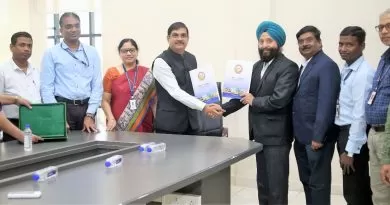OEA’s Odisha Vision 2036 Conclave held at Utkal University

The Orissa Economics Association (OEA) in collaboration with the Department of Analytical and Applied Economics, Utkal University and School of Humanities and Social Sciences, National Institute of Science Education and Research (NISER) organised the Odisha Vision 2036 conclave here on university campus.
Secretary of OEA, Dr Amarendra Das said Odisha is already a middle income state and by 2036 there are all possibilities of transforming the state into a high income state.
Prof Keshab Das, president of OEA said that the objective of this conclave is to make the making of vision document inclusive and broad basing. Governor Prof Ganeshi Lal in his inaugural speech said that Odisha’s development approach has been based on peace, prosperity and happiness. While envisioning for Odisha in 2036 we should go beyond growth metrics. Vice-chancellor of Utkal University Prof Sabita Acharya, thanked the Governor of Odisha for inaugurating the conclave.
Rajesh Mahapatra, editor of PTI suggested that we should give more emphasis towards ensuring democratic methods of governance than showing too much obsession for growth numbers that benefits only a few people. Amar Patnaik said that the threat of climate change is looming large. We need to give importance on multidimensional growth indicators than any single indicator of development.
Panchanan Kanungo argued that Odisha should give focus on self-reliance in food production and improvement of human development. Focus on health, nutrition, skill development can increase the strength of the state. Promotion of hockey might not be sufficient to build up the capacity of tribal population.
Soumyaranjan Patnaik said that we need to understand why we are not able to use the political mandate for fulfilling our development mandates. The objective of the present governments is to only win elections and all governments are remaining in election mode. This is not good for a welfare state. Public perception on the supremacy of judiciary and lack of debate and discussions in the legislative system are not good for democracy.
Tathagata Satpathy said that the present system is captured by the capitalists. Therefore, the public policy making and governance system benefits only a few people. He also raised concern that our society does not give respect to labour, which is not a good sign of a welfare state.
Prof Asoka Das, vice-chairman of Odisha state higher education council, Prof Ashoka Mohapatra, former director, AIIMs-Bhubaneswar, Sanjeeb Chandra Hota and Abha Mishra, Odisha state head, UNDP shared their views on how to transform Odisha into a prosperous state. Prof Mitali Chinara, Prof Himanshu Sekhar Rout, Prof Sanjukta Das, Prof Dharmabrata Mohapatra also spoke.



